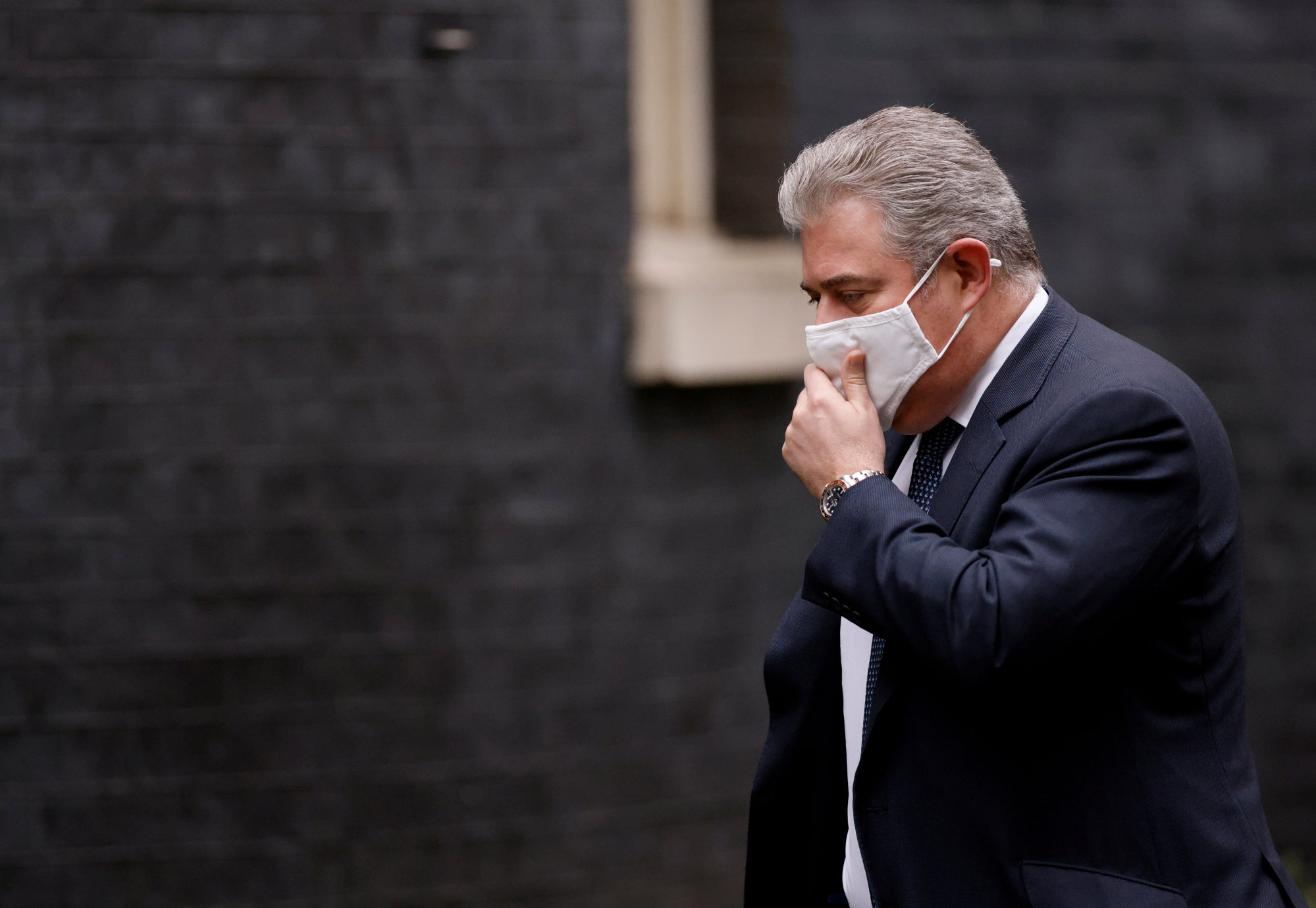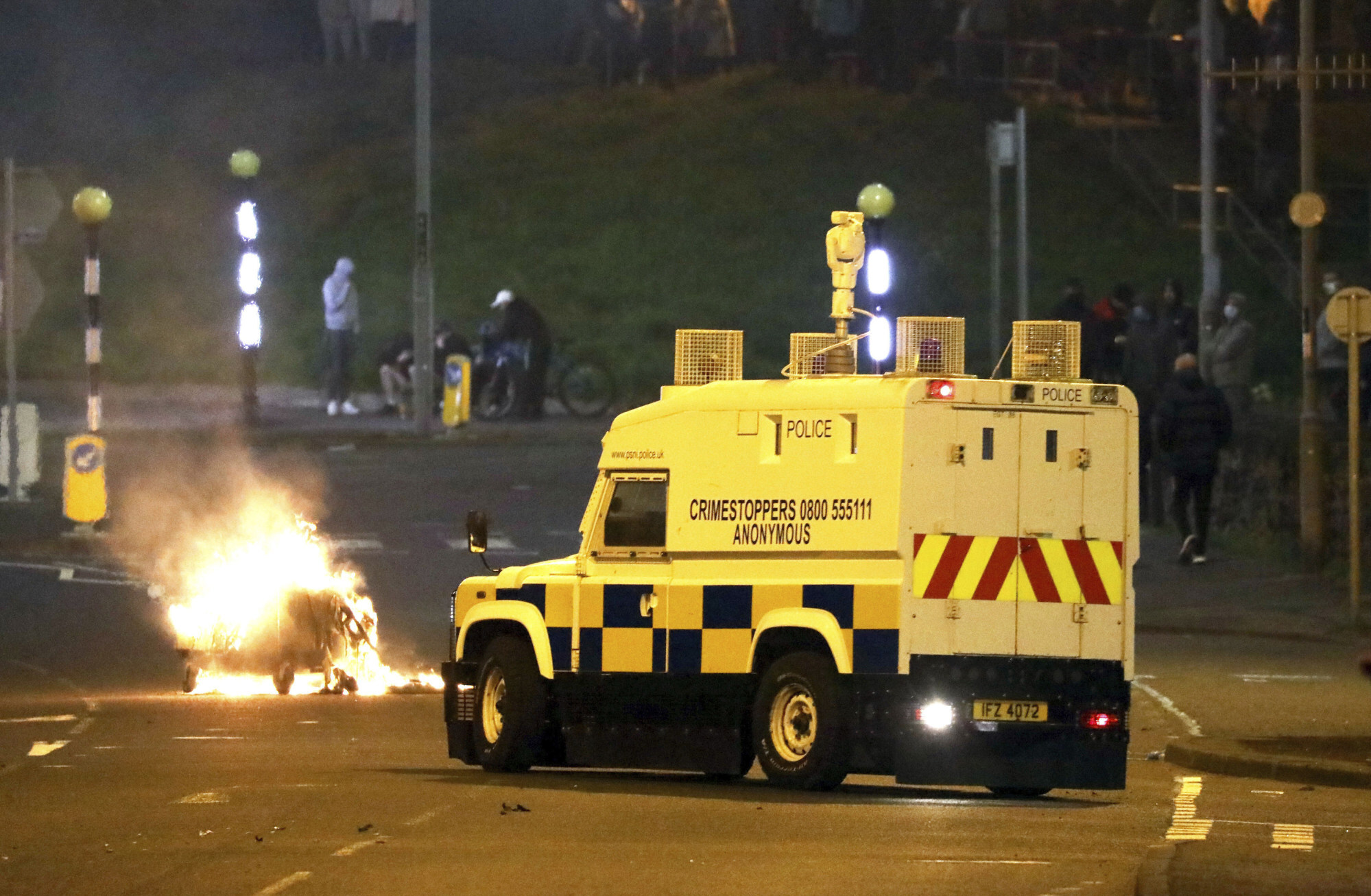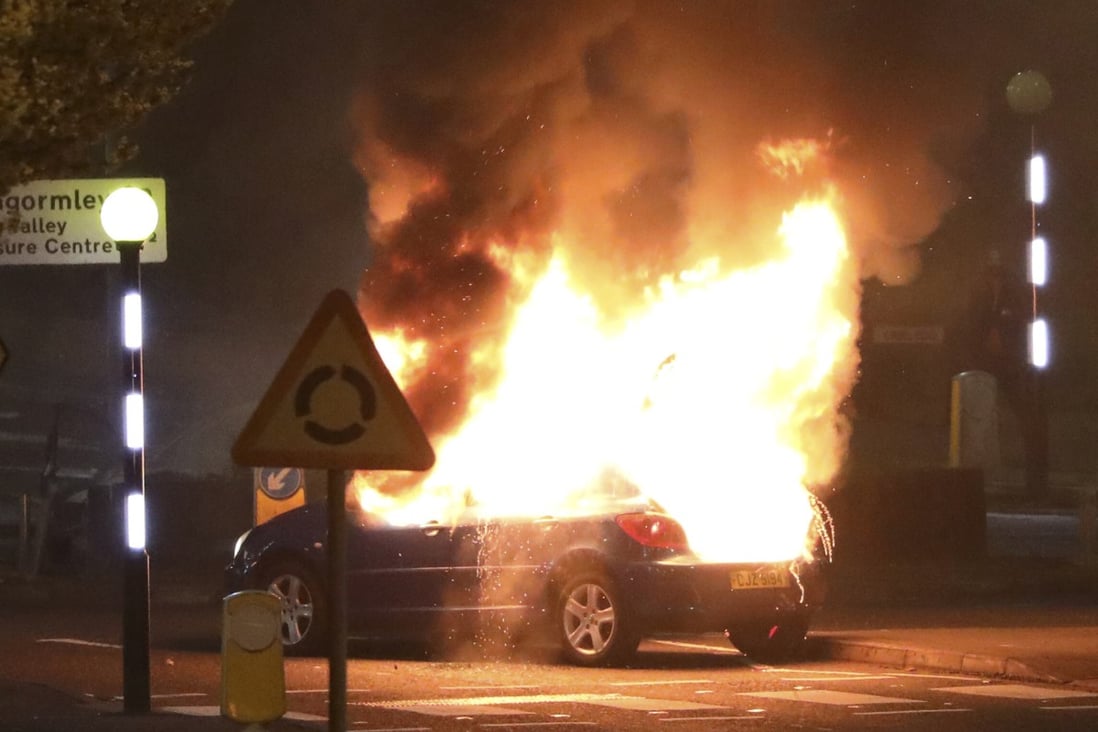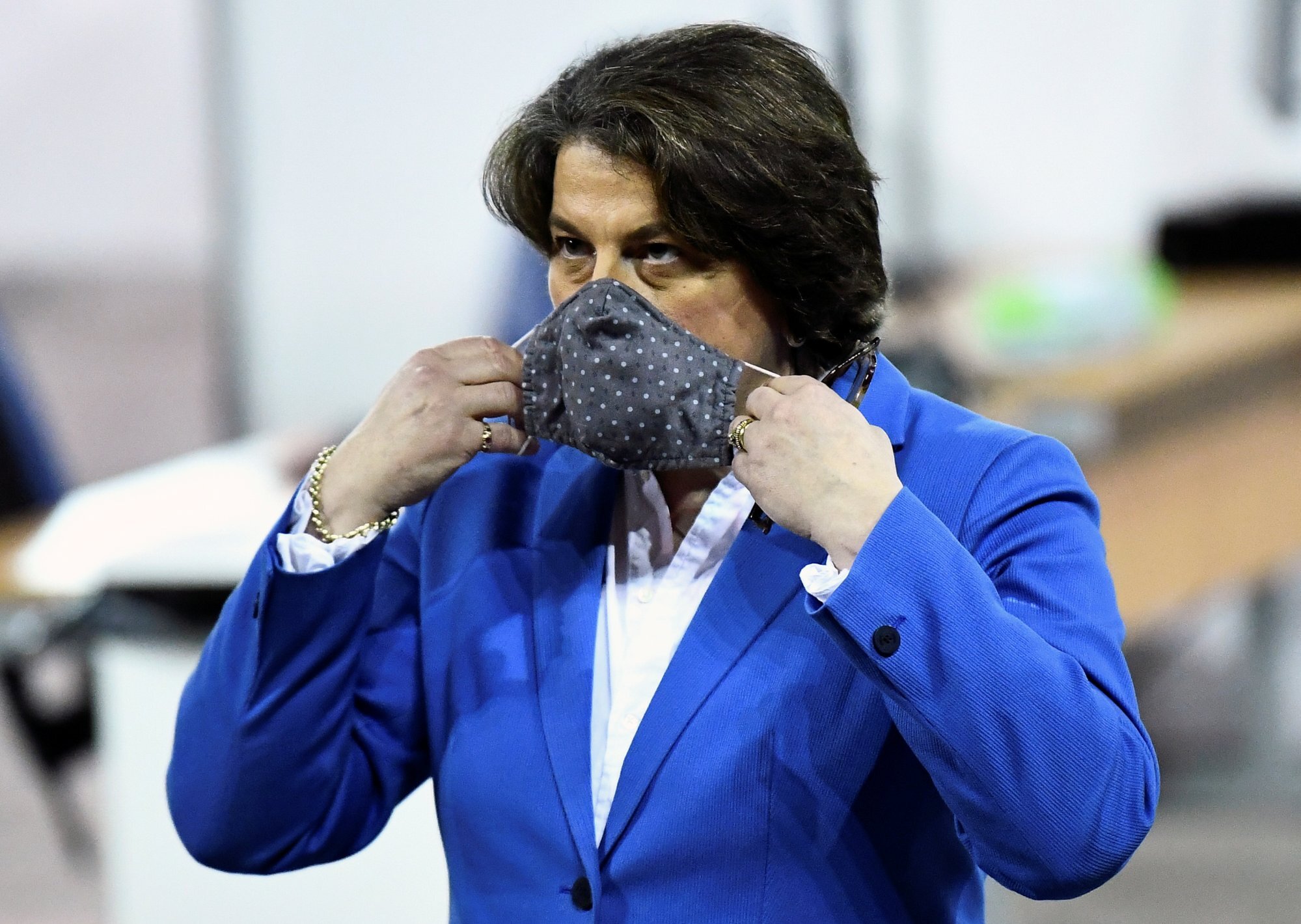Belfast in turmoil as Brexit stokes tensions in Northern Ireland
Issued on: 09/04/2021 -

Issued on: 09/04/2021 -

A week of unrest in Northern Ireland showed no sign of letting up Thursday night
Paul Faith AFP
Belfast (AFP)
Rioters waged a running battle with police in Belfast on Thursday night -- tossing petrol bombs, setting fires and dodging jets from water cannon as a week of unrest showed no sign of letting up.
Hundreds of boys and young men gathered from early evening in a western neighbourhood in the Northern Ireland capital, which has been riven by violence over Brexit and domestic politics.
Masked and in hooded tops, they hurled rocks, bricks and glass bottles at police barricades where riot officers formed ranks with armoured Land Rovers.
Petrol bombs burst into flames in the street and fireworks were aimed into police formations, exploding and smothering their lines in thick smoke.
Behind riot shields and with batons drawn, police drove back the surging crowds late into Thursday night, as locals peered out of their windows to witness the spectacle.
When one group tried to push a vandalised car into the police barricades, a lumbering water cannon forced them away with powerful spraying jets.
A police loudhailer warned crowds to disperse or face arrest.
"Force may be used," the female voice rang out.
Northern Ireland was the site of "The Troubles" sectarian conflict, which wound down in 1998 -- but Brexit has been partially blamed for igniting old tensions.
The unrest started last week in the pro-UK unionist community, where tensions are high because of new post-Brexit rules some feel are dividing the region from Britain.
But the pro-Ireland nationalist community has begun to respond in scenes like those of Thursday night.
Nationalist and unionist communities in Belfast are often separated by towering "peace walls" to guard against projectiles.
On Wednesday there were ugly scenes when warring groups from unionist and nationalist communities faced off at a gate in the peace wall between their neighbourhoods.
The doors are etched with a slogan reading: "There was never a good war or a bad peace."
But the gates were pried open and rioters traded missiles in vicious confrontations.
- Spiralling situation -
"It's deep rooted, it's not just about Brexit although Brexit has done something as well obviously," Belfast native Fiona McMahon told AFP earlier on Thursday.
"We have been scuppered big time," she said, voicing the sense of exasperation many here feel over Britain's split from the EU.
The rising unrest has caused a political crisis in Northern Ireland, with the regional assembly recalled to address the violence on Thursday.
British Prime Minister Boris Johnson, his Irish counterpart Micheal Martin and US President Joe Biden have all called for calm.
Meanwhile police have pleaded to those with "influence" in the community to hold back the crowds from participating in riots.
On Thursday dozens of older men and women stood at the gates where violence had flared the previous night and refused to let rioters approach.
A small number of men dismantled a fire being started and blocked others approaching the gate with projectiles.
Two amongst the crowd told AFP they were concerned figures from the surrounding community -- a sign that those who still remember "The Troubles" are unwilling to let the region slide back into its dark past.
© 2021 AFP
Belfast (AFP)
Rioters waged a running battle with police in Belfast on Thursday night -- tossing petrol bombs, setting fires and dodging jets from water cannon as a week of unrest showed no sign of letting up.
Hundreds of boys and young men gathered from early evening in a western neighbourhood in the Northern Ireland capital, which has been riven by violence over Brexit and domestic politics.
Masked and in hooded tops, they hurled rocks, bricks and glass bottles at police barricades where riot officers formed ranks with armoured Land Rovers.
Petrol bombs burst into flames in the street and fireworks were aimed into police formations, exploding and smothering their lines in thick smoke.
Behind riot shields and with batons drawn, police drove back the surging crowds late into Thursday night, as locals peered out of their windows to witness the spectacle.
When one group tried to push a vandalised car into the police barricades, a lumbering water cannon forced them away with powerful spraying jets.
A police loudhailer warned crowds to disperse or face arrest.
"Force may be used," the female voice rang out.
Northern Ireland was the site of "The Troubles" sectarian conflict, which wound down in 1998 -- but Brexit has been partially blamed for igniting old tensions.
The unrest started last week in the pro-UK unionist community, where tensions are high because of new post-Brexit rules some feel are dividing the region from Britain.
But the pro-Ireland nationalist community has begun to respond in scenes like those of Thursday night.
Nationalist and unionist communities in Belfast are often separated by towering "peace walls" to guard against projectiles.
On Wednesday there were ugly scenes when warring groups from unionist and nationalist communities faced off at a gate in the peace wall between their neighbourhoods.
The doors are etched with a slogan reading: "There was never a good war or a bad peace."
But the gates were pried open and rioters traded missiles in vicious confrontations.
- Spiralling situation -
"It's deep rooted, it's not just about Brexit although Brexit has done something as well obviously," Belfast native Fiona McMahon told AFP earlier on Thursday.
"We have been scuppered big time," she said, voicing the sense of exasperation many here feel over Britain's split from the EU.
The rising unrest has caused a political crisis in Northern Ireland, with the regional assembly recalled to address the violence on Thursday.
British Prime Minister Boris Johnson, his Irish counterpart Micheal Martin and US President Joe Biden have all called for calm.
Meanwhile police have pleaded to those with "influence" in the community to hold back the crowds from participating in riots.
On Thursday dozens of older men and women stood at the gates where violence had flared the previous night and refused to let rioters approach.
A small number of men dismantled a fire being started and blocked others approaching the gate with projectiles.
Two amongst the crowd told AFP they were concerned figures from the surrounding community -- a sign that those who still remember "The Troubles" are unwilling to let the region slide back into its dark past.
© 2021 AFP
Riots flare again in Northern Ireland despite calls for calm
Issued on: 09/04/2021 -
Text by: NEWS WIRE
Northern Ireland police faced a barrage of petrol bombs and rocks on Thursday, an AFP journalist said, as violence once again flared in Belfast despite pleas for calm.
Riot police on the republican side of the divided city were pelted with projectiles as they tried to prevent a crowd moving towards pro-UK unionists.
British Prime Minister Boris Johnson and Irish counterpart Micheal Martin had earlier called for “calm” following days of violence that included a petrol-bomb attack on a moving bus.
Martin and Johnson held telephone talks in which they stressed that “violence is unacceptable” and “called for calm”, the Irish leader’s office said.
But their calls went unheeded as night fell in Belfast, with unrest breaking out on the republican side of the capital.
Rioting over the last few days—the city’s worst unrest in recent years—had mainly stemmed from its unionist community, leading to joint condemnation from political leaders in the British province.
Unionists are angry over apparent economic dislocation due to Brexit and existing tensions with pro-Irish nationalist communities.
“Destruction, violence and the threat of violence are completely unacceptable and unjustifiable, no matter what concerns may exist in communities,” said the Northern Ireland executive—made up of unionist, nationalist and centrist parties.
“While our political positions are very different on many issues, we are all united in our support for law and order.”
Northern Ireland Secretary Brandon Lewis visited Belfast to meet leaders from the main parties, including unionist First Minister Arlene Foster and deputy First Minister Michelle O’Neill of Sinn Fein, as well as faith and community advocates.
He called the joint condemnation “a very clear statement”, adding “there is no excuse for violence, we’ve got to make sure we take things forward in a proper democratic and political way.”
In Washington, the White House also expressed concern over the violence and urged calm.
‘Sectarian violence’
In the disorder on Wednesday, gates were set alight on a “peace line”—walls separating pro-Irish nationalist and unionist communities—and police said crowds from either side broke through to attack each other with petrol bombs, missiles and fireworks.
Police Service of Northern Ireland (PSNI) temporary assistant chief constable Jonathan Roberts said the scale and nature of the violence was unprecedented in recent years.
“The fact that it was sectarian violence and there was large groups on both sides... again is not something we have seen for a number of years,” he told reporters.
Before Thursday, six nights of unrest left 55 police injured, Roberts noted, as well as a press photographer and the driver of the bus fire-bombed Wednesday.
He said children as young as 13 were suspected of involvement following encouragement from adults, and the large volume of petrol bombs used suggested “a level of pre-planning”.
The PSNI is probing if Northern Ireland’s notorious paramilitary groups were involved in the unrest.
‘Deep rooted’
Northern Ireland endured 30 years of sectarian conflict that killed 3,500 people.
Unionist paramilitaries, British security forces and armed nationalists seeking to unite the territory with the Republic of Ireland waged battle until a landmark peace deal in 1998.
The accord let unionists and nationalists coexist by blurring the status of the region, dissolving border checks with fellow European Union member Ireland.
But Britain’s 2016 vote to quit the EU revived the need for border checks. A special “protocol” was agreed that shifted the controls away from the land border to ports trading with the UK mainland, prompting many unionists to accuse London of betrayal.
There was also recent outrage among unionists after Northern Irish authorities decided not to prosecute Sinn Fein leaders for attending a large funeral last year of a former paramilitary leader, in apparent breach of Covid restrictions.
Few people in central Belfast on Thursday wanted to discuss the sensitive situation.
“It’s deep-rooted, it’s not just about Brexit,” said Fiona McMahon, 56, before adding Britain’s EU withdrawal had had a “massive impact”.
“The British do whatever the hell they want to do and we get landed with everything afterwards,” she told AFP.
PM Johnson tweeted overnight that he was “deeply concerned”, saying “the way to resolve differences is through dialogue, not violence or criminality”.
Johnson and Martin agreed during their call that “the way forward is through dialogue and working the institutions of the Good Friday Agreement,” according to Dublin.
(AFP)
At least 27 police officers injured in Northern Ireland unrest as politicians call for calm
Police said a care home was damaged in the during the violence causing ‘untold fear and distress’ to residents
The DUP leader said: “I know that many of our young people are hugely frustrated by the events of this last week but causing injury to police officers will not make things better.
“And I send my strong support to all of the rank-and-file police officers that are on duty over this Easter weekend.
“I appeal to our young people not to get drawn into disorder which will lead to them having criminal convictions and blighting their own lives.
“I also ask parents to play their part and be proactive in protecting their young adults.”

Secretary of State for Northern Ireland Brandon Lewis. Photo: Reuters
Northern Ireland Secretary Brandon Lewis described the unrest as “completely unacceptable.”
Lewis said: “Violence is never the answer. There is no place for it in society.
“It is unwanted, unwarranted and I fully support the PSNI appeal for calm.”
He added that his thoughts were with the officers injured.
The disorder has flared amid ongoing tensions within loyalism across Northern Ireland.

The Police Service of Northern Ireland comes under attack by Loyalists in Newtownabbey, Belfast, Northern Ireland on Saturday. Photo: PA via AP
Loyalists and unionists are angry about post-Brexit trading arrangements which they claim have created barriers between Northern Ireland and the rest of the United Kingdom.
Tensions ramped up further this week following a controversial decision not to prosecute 24 Sinn Fein politicians for attending a large-scale republican funeral during Covid-19 restrictions.
All the main unionist parties have demanded the resignation of PSNI Chief Constable Simon Byrne, claiming he has lost the confidence of their community.
Police said a care home was damaged in the during the violence causing ‘untold fear and distress’ to residents
In Belfast two boys, aged 13 and 14, were among those arrested in connection with riots in a loyalist area of the city
Loyalists and unionists are angry about post-Brexit trading arrangements which they claim have created barriers between Northern Ireland and the rest of the United Kingdom.
DPA
Published: , 4 Apr, 2021

A car burns after it was hijacked by Loyalists in Belfast, Northern Ireland on Saturday. Photo: PA via AP
A total of 27 police officers have been injured in unrest in Northern Ireland as political leaders call for calm over the Easter weekend.
The Police Service of Northern Ireland (PSNI) said 15 officers were injured in Belfast and 12 officers were hurt in Londonderry during riots in both cities on Friday evening. Eight people have been arrested.
Derry City and Strabane Area Commander Chief Superintendent Darrin Jones said police received reports on Friday night of youths gathering in the areas of Nelson Drive and Tullyally in the city.
“On their arrival, they came under sustained attack from a large group of youths and young adults throwing masonry, bottles, petrol bombs and fireworks,” he said
“As a result 12 officers sustained injuries including head, leg and foot wounds.
Jones also said a care home was damaged in the city during the violence causing “untold fear and distress” to residents. He said it was “totally unacceptable” that Friday was the fifth successive night of disturbances in the unionist Waterside area of the city.
“It is vital that we all send out a message to those responsible that such behaviour will not be tolerated,” he said.
“The people of Derry/Londonderry deserve to feel safe within their own homes and be able to walk the streets without fear.
“I would ask that anyone who has any influence in communities – whether parents, guardians, community or elected representatives – please, use that influence to ensure young people do not get caught up in criminality and that they are kept safe and away from harm.”

A boy looks on as flames and smoke rise behind him at the scene of violence in Newtownabbey, north of Belfast, Northern Ireland on Saturday. Photo: AFP
In Belfast, two boys, aged 13 and 14, are among eight people arrested in connection with riots in a loyalist area of Belfast.
Police said 15 officers were injured on Friday night after being targeted by a crowd of mainly young people in Sandy Row, throwing stones, fireworks, flares, manhole covers and petrol bombs.
Belfast District Commander, Chief Superintendent Simon Walls, said “a small local protest quickly developed into an attack on police officers” and that at points there were up to 300 people of all ages on the streets.
He called for calm, urging anyone with influence in the loyalist community to dissuade young people from causing violence and harm. He said: “I’m not going to enter into dialogue about political commentary.
“What I would ask is that people with influence, people in local communities, would dissuade young people, or anyone else, intent on causing violence or intent on harming police officers.”

Northern Ireland’s First Minister Arlene Foster. Photo: Reuters
He described it as a “real tragedy” that children as young as 13 and 14 were among those arrested.
“I think it’s a tragedy that any child in Northern Ireland is sitting in a custody suite this morning and facing criminal investigation, possibility of being charged and possibility of facing a criminal conviction,” he said.
“It shouldn’t happen. And that’s why I’m very keen that people with influence try to ask anyone intent on violence to please step back. It’s not the way to resolve tensions or arguments.”
Political leaders have also called for calm over the Easter weekend following the riots.
Stormont’s First Minister Arlene Foster urged young people “not to get drawn into disorder,” saying violence “will not make things better”.
DPA
Published: , 4 Apr, 2021

A car burns after it was hijacked by Loyalists in Belfast, Northern Ireland on Saturday. Photo: PA via AP
A total of 27 police officers have been injured in unrest in Northern Ireland as political leaders call for calm over the Easter weekend.
The Police Service of Northern Ireland (PSNI) said 15 officers were injured in Belfast and 12 officers were hurt in Londonderry during riots in both cities on Friday evening. Eight people have been arrested.
Derry City and Strabane Area Commander Chief Superintendent Darrin Jones said police received reports on Friday night of youths gathering in the areas of Nelson Drive and Tullyally in the city.
“On their arrival, they came under sustained attack from a large group of youths and young adults throwing masonry, bottles, petrol bombs and fireworks,” he said
“As a result 12 officers sustained injuries including head, leg and foot wounds.
Jones also said a care home was damaged in the city during the violence causing “untold fear and distress” to residents. He said it was “totally unacceptable” that Friday was the fifth successive night of disturbances in the unionist Waterside area of the city.
“It is vital that we all send out a message to those responsible that such behaviour will not be tolerated,” he said.
“The people of Derry/Londonderry deserve to feel safe within their own homes and be able to walk the streets without fear.
“I would ask that anyone who has any influence in communities – whether parents, guardians, community or elected representatives – please, use that influence to ensure young people do not get caught up in criminality and that they are kept safe and away from harm.”

A boy looks on as flames and smoke rise behind him at the scene of violence in Newtownabbey, north of Belfast, Northern Ireland on Saturday. Photo: AFP
In Belfast, two boys, aged 13 and 14, are among eight people arrested in connection with riots in a loyalist area of Belfast.
Police said 15 officers were injured on Friday night after being targeted by a crowd of mainly young people in Sandy Row, throwing stones, fireworks, flares, manhole covers and petrol bombs.
Belfast District Commander, Chief Superintendent Simon Walls, said “a small local protest quickly developed into an attack on police officers” and that at points there were up to 300 people of all ages on the streets.
He called for calm, urging anyone with influence in the loyalist community to dissuade young people from causing violence and harm. He said: “I’m not going to enter into dialogue about political commentary.
“What I would ask is that people with influence, people in local communities, would dissuade young people, or anyone else, intent on causing violence or intent on harming police officers.”

Northern Ireland’s First Minister Arlene Foster. Photo: Reuters
He described it as a “real tragedy” that children as young as 13 and 14 were among those arrested.
“I think it’s a tragedy that any child in Northern Ireland is sitting in a custody suite this morning and facing criminal investigation, possibility of being charged and possibility of facing a criminal conviction,” he said.
“It shouldn’t happen. And that’s why I’m very keen that people with influence try to ask anyone intent on violence to please step back. It’s not the way to resolve tensions or arguments.”
Political leaders have also called for calm over the Easter weekend following the riots.
Stormont’s First Minister Arlene Foster urged young people “not to get drawn into disorder,” saying violence “will not make things better”.
I appeal to our young people not to get drawn into disorder which will lead to them having criminal convictions and blighting their own lives
Arlene Foster, Stormont’s First Minister
The DUP leader said: “I know that many of our young people are hugely frustrated by the events of this last week but causing injury to police officers will not make things better.
“And I send my strong support to all of the rank-and-file police officers that are on duty over this Easter weekend.
“I appeal to our young people not to get drawn into disorder which will lead to them having criminal convictions and blighting their own lives.
“I also ask parents to play their part and be proactive in protecting their young adults.”

Secretary of State for Northern Ireland Brandon Lewis. Photo: Reuters
Northern Ireland Secretary Brandon Lewis described the unrest as “completely unacceptable.”
Lewis said: “Violence is never the answer. There is no place for it in society.
“It is unwanted, unwarranted and I fully support the PSNI appeal for calm.”
He added that his thoughts were with the officers injured.
The disorder has flared amid ongoing tensions within loyalism across Northern Ireland.

The Police Service of Northern Ireland comes under attack by Loyalists in Newtownabbey, Belfast, Northern Ireland on Saturday. Photo: PA via AP
Loyalists and unionists are angry about post-Brexit trading arrangements which they claim have created barriers between Northern Ireland and the rest of the United Kingdom.
Tensions ramped up further this week following a controversial decision not to prosecute 24 Sinn Fein politicians for attending a large-scale republican funeral during Covid-19 restrictions.
All the main unionist parties have demanded the resignation of PSNI Chief Constable Simon Byrne, claiming he has lost the confidence of their community.
No comments:
Post a Comment